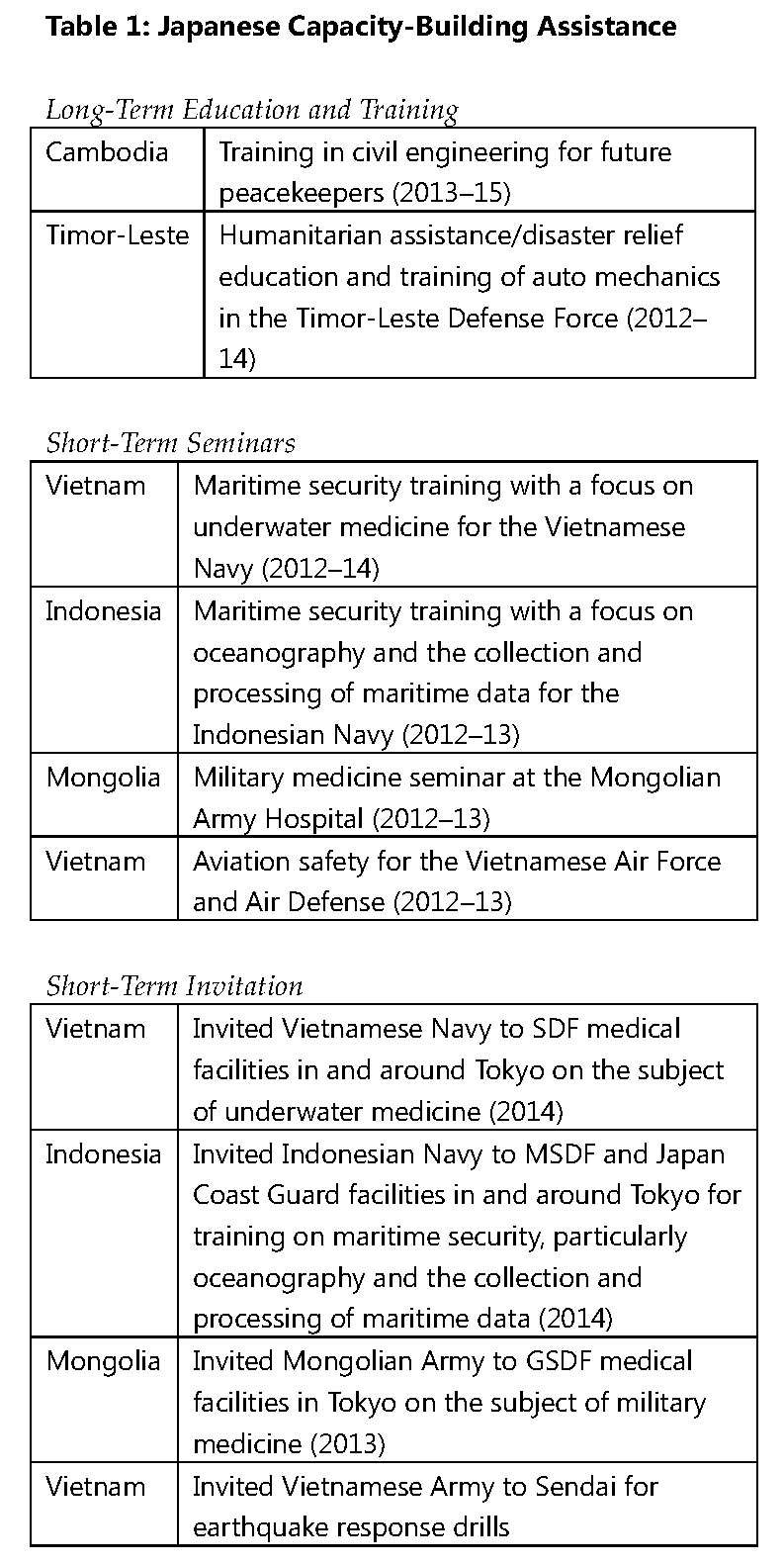- Article
- Comparative and Area Studies
Japan-Europe Cooperation for Peace and Stability: Pursuing Synergies on a Comprehensive Approach
June 3, 2015
The scope of Japanese and European development cooperation goes beyond promoting economic growth and includes strengthening governance and resilience in fragile states in both pre and post-conflict situations. In assisting such states, writes Senior Fellow Akiko Fukushima in this Policy Brief originally published by the German Marshall Fund of the United States , Japan and Europe share the common goals of building peace, stability, prosperity, and resilience.
* * *
Introduction
Japan and Europe have long provided development assistance in line with their respective geographic priorities. But in an increasingly globalized world, the regions on which they focus their assistance have begun to overlap, in places such as Africa for example. Today’s security challenges include not only inter-state war, but also terrorism, organized crime, human trafficking, climate change, and pandemics. The scope of Japanese and European development cooperation now goes beyond promoting economic growth and includes strengthening governance and resilience in fragile states in both pre and post-conflict situations.
In assisting such states, Japan and Europe share the common goals of building peace, stability, prosperity, and resilience. As terrorists and criminal groups, notably the Islamic State and Boko Haram, make new inroads and expand their sphere of control and influence, Europe and Japan should join together to address these concerns. In assisting fragile states, the European Union has pursued a multi-faceted approach in the Horn of Africa and the Sahel, using economic, security and cultural instruments. This approach has come to be known as “comprehensive approach” in EU, “whole-of-government approach” in some European countries and “3D” approach as it combines diplomacy, defense and development in the United States. Regardless of the label, there is a clear need to take a more comprehensive, holistic approach to providing aid.
Although less well recognized than the European initiative, Japan is also taking a comprehensive approach to foreign assistance. Its Development Cooperation Charter, announced in February 2015, applies a “human security” approach to development cooperation. [1] “Human security” is a concept that affirms the right of individuals, through their protection and empowerment, to live in dignity – free from fear and want. [2] While in the past Japan has placed an emphasis on the freedom from want through poverty reduction and economic development, it is now poised to enhance its cooperation to promote the freedom from fear. Culture too, is an important feature in the holistic approach to human security. Thus, Europe’s “comprehensive” approach and Japan’s human security approaches are similar in terms of their modi operandi and objectives.
The 2014 OECD Development Co-operation Peer Reviews took note of Japan’s comprehensive approach, observing that the Japanese government has created “an elevated profile in its global engagement strategy” and “strengthened its whole-of-government approach at country level.” [3] This paper examines possible areas for new and enhanced cooperation between Japan and Europe, two responsible global partners who share fundamental values and principles in assisting fragile and developing states, particularly in the area of capacity-building assistance.
Cooperating with Piracy Control
At the 22nd Japan-EU Summit in Brussels on May 7, 2014, Prime Minister Shinzo Abe, European Council President Herman Van Rompuy, and President of the European Commission Jose Manuel Barroso agreed to promote closer collaboration between the EU’s Common Security and Defense Policy (CSDP) missions and Japan’s assistance and security cooperation initiatives.
Such cooperation is not new. Japan and the EU have been working together to fight piracy off the Coast of Somalia and in the Gulf of Aden for years. Maritime Self-Defense Force (MSDF) destroyers have participated since March 2009, along with two P-3C maritime patrol aircraft added in June 2009. The MSDF unit provides information to the forces of other states conducting operations in the field, including EU Naval Force (NAVFOR) Somalia-Operation Atalanta, a Common Security and Defence Policy (CSDP) military mission that has been in operation since December 2008. On January 18, 2014, Japan-EU cooperation led to the capture of pirates when a helicopter from the MSDF destroyer Samidare and a P-3C patrol aircraft detected a suspicious dhow and provided this information to the Combined Task Force 151 headquarters. In response, a helicopter from a French EU NAVFOR naval vessel was dispatched, leading to the capture of five pirates and the release of the dhow’s crew.
Japan and Europe have been conducting joint exercises since October 2014. In October and November 2014, MDSF destroyer Takanami participated in exercises with Italian, German, and Dutch naval vessels that included such activities as communications, tactical maneuvering, helicopter take-off and landing, and boarding.
As these operations have been successful in controlling piracy in the Gulf of Aden, it may eventually be possible to withdraw the MSDF, at which point addressing the root causes of piracy and building the capacity of local coast guards would become vitally important. Both Europe and Japan are providing development assistance to Somalia and surrounding countries, and are also helping to train local maritime security officials. In addition to development assistance to enhance local governance capabilities and economic development, further collaboration on capacity building should make a significant contribution to local empowerment.
Collaborating with CSDP Missions through Japan’s Official Development Assistance
Following the aforementioned Japan-EU summit agreement, Japan has been cooperating with CSDP missions to provide capacity-building assistance in Niger and Mali as well.

The EU dispatched a civilian CSDP mission to provide training and advice to Niger’s security sector in August 2012. This was supplemented in December 2014, when Japan made a decision to provide grant aid through the UN Development Program to this CSDP mission. To facilitate coordination, Japan is contributing 202 million for wireless communication devices to connect regional government offices with bureaus under their jurisdiction, as well as wireless-equipped vehicles for patrolling outlying locations. The equipment will be provided to all seven of Niger’s regions.
In April 2014, the EU decided to dispatch a civilian CSDP mission to help improve Mali’s security capabilities. In March 2015, Japan agreed to provide grant aid amounting to 492 million for the rehabilitation of Mali’s national police school, provision of information technology and other equipment, and the development of human resources.
Japan’s cooperation with CSDP missions was facilitated by its experience of using the Official Development Assistance (ODA) budget to help rebuild infrastructure in Iraq during peace operations by the Japanese Self-Defense Force (SDF). Similar coordination between ODA and the SDF was seen in the peacebuilding operations in Timor Leste and in disaster-relief assistance to Haiti. Currently, an SDF engineering unit is taking part in the UN Mission in South Sudan (UNMISS), contributing to peacebuilding efforts by repairing roads and other infrastructure. The ODA grassroots and human security budget has been mobilized for these projects, making Japan’s contributions more effective. These experiences, under the so-called “All-Japan Approach,” have paved the way for Japan’s collaboration with CSDP capacity building missions.
Cooperating with Capacity Building
Under the comprehensive approach, assistance is not limited to the provision of infrastructure for economic development. It also covers efforts to strengthen governance and help build capacity in the local community. This is designed to foster resilience against crises, which is crucial to halting the spread of organized crime and terrorism. Capacity-building assistance is an area with great potential for future cooperation between Japan and Europe.
Under the comprehensive approach, assistance is not limited to the provision of infrastructure for economic development. It also covers efforts to strengthen governance and help build capacity in the local community. This is designed to foster resilience against crises, which is crucial to halting the spread of organized crime and terrorism. Capacity-building assistance is an area with great potential for future cooperation between Japan and Europe.
Since capacity-building assistance is not explicitly included in the mandate of Japan’s Ministry of Defense, the logic supporting it is that such assistance can stabilize and improve the international security environment, contributing to Japan’s national security. It can also strengthen relations with the recipient countries and other donors, in turn improving Japan’s standing in the international community. Revising the Establishment of the Ministry of Defense Law to include international cooperation as one of the missions of the ministry would give Japan greater leeway in providing this assistance.
In capacity development assistance through other agencies, for example in the area of piracy control, the Japan Coast Guard provides training in collaboration with the Japan International Cooperation Agency, inviting the participation of coast guards from Southeast Asia. It also sends experts to the Philippines, Malaysia, and Indonesia to train maritime security personnel. When Japan provided coastguard ships to Indonesia in 2009, experts were also dispatched to provide training. This is a model that can be emulated elsewhere.
Toward Future Cooperation
As Japan enhances its comprehensive approach to development cooperation under its Development Cooperation Charter along with new and revised security legislation, additional windows of opportunity are opening for cooperation with Europe, particularly in regions of mutual interest such as Africa and Asia. Capacity-building assistance is an important means of empowering local people and institutions, furthering the pursuit of both freedom from want and freedom from fear to promote human security. These two goals should be pursued in tandem.
Finally, as capacity-building assistance is a relatively new area, the EU, NATO, and Japan should look to the cross fertilization of ideas amongst interested parties. This would be useful in building intellectual and policy frameworks for present and future activities.
1. Ministry of Foreign Affairs, Development Cooperation Charter, February 10, 2015.
3. OECD Development Co-operation Peer Reviews: Japan 2014 , p.14, http://www.oecd. org/development/peer-reviews/Japan-peer-review-2014.pdf.
Originally published as a Policy Brief by the Asia Program of the German Marshall Fund of the United States . It is reprinted here with the permission of the GMF.

